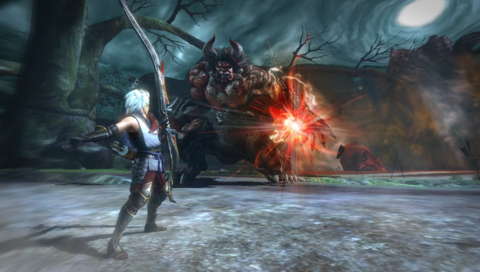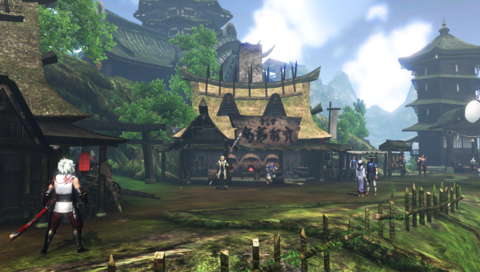Based solely on its Japanese-history-inspired setting and ornately costumed, sharp-steel-wielding heroes, Toukiden: The Age of Demons could pass for another sequel or spin-off in developer Omega Force's Dynasty Warriors series. Before your oversized sword can draw its first drop of blood, however, you find the game's surface similarities give way to an experience that shares more with Capcom's Monster Hunter games than anything in the developer's existing library of Warriors titles. From its save-the-world storyline and screen-swallowing boss battles to its party-based play and grinding loop of laying waste to uglies, looting their corpses, and leveling up your character and gear, Toukiden will feel comfortably familiar to anyone who has ever invested an evening into besting a towering beast in Capcom's creature-slaying series. More than a mere copycat, though, Toukiden complements its cloned Monster Hunter elements with enough fresh features, nuance, and ideas to earn its own identity.
For starters, the pacing of its combat is driven by more than the light and heavy attacks it initially teaches you. As an appropriately dubbed slayer, you must rid the world of oni, demons that aren't particularly interested in living peacefully among humankind. Battling these netherworld baddies requires the expected hacking, slashing, and elemental magic casting, but purifying their dismembered body parts adds a satisfying wrinkle to the slaughter. The act temporarily leaves you vulnerable, but ensures the lopped limbs won't regenerate. Purifying also loots resources from downed foes and siphons life from bigger bads who are still kicking despite losing an arm, leg, or spiky tentacle.

This extra strategic element is further complemented by mitama, souls of fallen slayers that are occasionally released through purification. These rare drops, representing the different offensive and defensive disciplines--combat, regeneration, speed, and so on--of their previous owners, can be assigned to slots in your weapons. Once a mitama is firmly rooted in the handle of a sword--or the grip of another upgradable death-dealer (spear, dual daggers, bow, gauntlets, chain and sickle)--it can be triggered during battle. By activating mitama, you can unleash various table-turning powers, all of which have limited quantities per mission and run on cooldown timers. Finding new mitama, which also unlocks collectible-card-like pictures and backstories of their slayers, quickly becomes a compelling little metagame, but managing them during boss battles brings a welcome strategic layer to the otherwise button-mashy combat. You monitor a regenerating focus meter, which can be activated to identify enemy weak points as well as other invaluable intel and items, adding yet another resource to your arsenal.
Sure, its similarities to the competition are undeniable, but Omega Force has crafted a Monster Hunter clone that generally stands on its own.
Armchair adventurers will discover more depth back at the hublike village, where the usual lineup of chatty non-player characters--merchants, blacksmiths, scared citizens--encourage you to buy and sell goods, upgrade and forge gear, and even level up those precious mitama. Those looking for a brief reprieve from facing inhabitants of the horned, fanged, and clawed variety can also interact with villagers and cuddly animals who'll grant them side quests and gather resources for them, respectively.

Like Monster Hunter, Toukiden is best enjoyed with friends who don't shudder at the thought of having their spines used as dental floss. Online lobbies, supporting four-player adventures and sporting a fairly robust search criteria for different game types, let you join the fight alongside friends and strangers in both ad hoc and infrastructure modes. While my online experience was generally smooth and seamless, I found myself braving the battlefield alone most of the time. Where co-op almost feels like a requirement in Monster Hunter, Toukiden's solid solo experience makes going it alone a viable option. This is due in no small part to AI party members that are more a help than a hindrance; on top of holding their own in combat and playing to their specific strengths, they happily purify for you, doing all the busywork while the loot is deposited directly into your bank.
Toukiden's pacing doesn't stray far from the genre's proclivity toward grinding. You spend plenty of time farming for resources, battling familiar foes, and facing bosses that take the better part of an hour to bring down. If you're not a fan of this very specific, often polarizing style of gameplay, you'll likely find its repetition more painful than any hurt a hell spawn can put on you. It doesn't help that Toukiden's visual presentation, while packing plenty of vibrant details and slick effects, lacks variety; environments aren't especially distinctive, and enemies are often repeated.
Sure, its similarities to the competition are undeniable, but Omega Force has crafted a Monster Hunter clone that generally stands on its own. While it could have felt like a shameless rip-off with a few half-baked features grafted on for good measure, Toukiden manages to organically weave its defining elements--purification and mitama--into the genre's comfortably familiar fabric.



